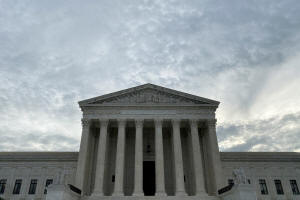U.S. Supreme Court to tackle football coach's on-field prayers
 Send a link to a friend
Send a link to a friend
 [April 25, 2022]
By Lawrence Hurley and Andrew Chung [April 25, 2022]
By Lawrence Hurley and Andrew Chung
(Reuters) - The U.S. Supreme Court on
Monday addresses the religious rights of government employees as it
weighs an appeal by a Christian former public high school football coach
in Washington state who was suspended from his job for refusing to stop
leading prayers with players on the field after games.
The justices are set to hear arguments in the case pitting the religious
rights of individual workers against the Constitution's prohibition on
the government endorsing a particular religion. The court's 6-3
conservative majority has taken a broad view of religious liberty in
numerous cases.
Joseph Kennedy, who served as a part-time assistant football coach in
the city of Bremerton, is appealing a lower court's ruling that rejected
his claims that the school district's decision to suspend him violated
his religious exercise and free speech rights under the U.S.
Constitution's First Amendment.
At issue is whether, as a public employee, Kennedy's prayers and
Christian-infused speeches alongside players amounted to governmental
speech, which can be regulated under Supreme Court precedents, or a
private act separate from his official duties, which the First Amendment
would protect.

The school district's lawyers have said Kennedy's legal team has
distorted what actually happened, weaving a "breathless tale of
authoritarian government forbidding private religious expression."
Kennedy is represented by First Liberty Institute, a religious liberty
group.
The district has argued that Kennedy "made a spectacle" of delivering
prayers and speeches, invited students to join him and courted media
attention while acting in his capacity as a government employee. It
added that such prayers coming from the coach could be coercive, while
some parents said their children felt compelled to participate.
The San Francisco-based 9th U.S. Circuit Court of Appeals last year
ruled against Kennedy, finding that local officials would have violated
the First Amendment's ban on government establishment of religion if
they let his actions continue.
"Teachers and coaches remain individuals with First Amendment rights on
school premises, and the suppression of the individual religious
expression of teachers and coaches is not permitted, let alone required,
by the First Amendment," Kennedy's lawyer, Paul Clement, said in court
papers.
[to top of second column]
|

A general view of the Supreme Court building at the start of the
court's new term in Washington, U.S. October 4, 2021.
REUTERS/Jonathan Ernst/File Photo
 Kennedy served as an assistant
football coach at his alma mater, Bremerton High School, from 2008
to 2015. The district said Kennedy delivered post-game prayers to
crowds of players and others for years until officials learned about
the religious nature of these sessions in 2015.
The district, concerned that Kennedy's actions could be perceived as
an impermissible government endorsement of religion, notified him to
stop the prayers while on duty, offering other private locations in
the school as alternatives.
Kennedy initially appeared to comply, the district said, but later
refused and made media appearances publicizing the dispute,
attracting national attention. After repeatedly defying school
officials' demands, he was placed on paid leave from his seasonal
contract and did not re-apply as a coach for the subsequent season.
Kennedy's lawyers assert that he "lost his job" because of his
actions, suing in federal court in 2016. Kennedy sought a court
order to be reinstated as a coach, accusing officials of religious
discrimination and violations of his free speech. Officials pointed
out in court papers that Kennedy no longer lives in the school
district and has moved to Florida, although he has said he would
return if he got his job back.
The Supreme Court in recent years has expanded individual religious
rights while also reducing the separation between church and state.
The justices are set to rule by the end of June on a challenge by
two Christian families to a Maine state tuition assistance program
that excludes private schools that promote religious beliefs. The
court's conservatives during arguments in the case in December
signaled support for the families.
(Reporting by Lawrence Hurley and Andrew Chung; Editing by Will
Dunham)
[© 2022 Thomson Reuters. All rights
reserved.] This
material may not be published, broadcast, rewritten or
redistributed.
Thompson Reuters is solely responsible for this content.
 |